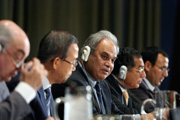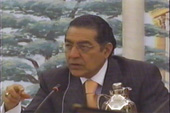 Madam Chair, 1. I have the honor to deliver this statement on behalf of the Group of 77 and China. Our Group would like to thank all briefers for introducing their respective reports. Madam Chair, 2. The Group attaches great importance to the work of the Board of Auditors in discharging external oversight of the Organization and, on this note, we express appreciation for the high quality of the Board's reports and its recommendations. We also welcome the submission of the audited financial statements for 2024. 3. The Group commends that the Board of Auditors conducted a survey among 17 entities and submitted a concise summary report with a special section, which enables the General Assembly to consider in detail the budget management across various entities. We believe that efficient financial and budget management is crucial for the United Nations to effectively deliver mandate in addressing global challenges and achieving the 2030 Agenda of Sustainable Development and is equally critical to advancing the UN80 initiative to make the Organization more agile, resilient and capable of providing high-quality and efficient services, while eliminating redundancy and overlap in mandate implementation. 4. The Group notes that, of 17 audited entities, 11 had concluded the financial year with a surplus, and 6 had recorded a deficit, when those numbers were 12 and 5 respectively in 2023. We further note with concern that IRMCT had a deficit for the sixth consecutive year and reiterate that more efforts must be made to improve their financial situation. 5. The Board has assessed that, in general, the financial position of all entities remained at least sufficient at the end of 2024. The liquidity ratios were comfortably high for most entities. But if there are no further improvements, those entities with ratios near or below 1 may face potential solvency issues in the future. 6. The Group is pleased to note that all entities under review have unqualified audit opinions from the Board of Auditors. We call upon all these entities to address the identified weaknesses while preserving the current accomplishments. Madam Chair, 7. The Group is concerned over a number of issues raised by the Board in its report, including: cost recovery services, development reforms, supply chain management, among others. 8. The Group notes that, by category, financial and budget management, programme and project management, governance and accountability, as well as assets management, together constituted 77 per cent of the total key findings in 2024. We emphasize that these management and oversight areas are of crucial importance to effective mandate delivery and the responsible stewardship of the UN resources, and we request the Secretariat to intensify its efforts to achieve further improvements in this regard. 9. The Group also notes that insufficient consolidation of information and communications technology procurement requirements, as well as the lack of system-wide contracts, has resulted in price disparities and higher costs. We look forward to strengthened consolidation of enterprise ICT demand requirements across all Secretariat entities. 10. In this regard, the Group underscores the need for enhanced investment in oversight and monitoring capacities in decentralized operations, including the availability of reliable data and the strengthening of empowered supervisory functions, as pointed out in the reports of UNICEF, UNFPA, and UN-Women. Recognizing that both external and internal auditors have a crucial role, the Group further stresses that senior management likewise requires robust, systematic and data-informed mechanisms to support timely and well-founded strategic decision-making. 11. The Group remains deeply concerned that substantial financial detriment continuously occurred in the UNOPS during the past few years. We are looking forward to seeing accountability measures to be taken and internal control to be strengthened in a timely manner to avoid recurrence of such cases. 12. The Group reiterates its concern over the imbalance of geographical representation of staff in a number of entities and in the resident coordinator system and stress the need to intensify the efforts to achieve equitable geographic representation among staff, with a special focus on unrepresented or underrepresented Member States. Madam Chair, 13. Turning to the status of the implementation of the recommendations of the Board, the Group notes that of the overall implementation rate was 51.60 per cent in 2024, which remains stable compared with 2023. The Group stresses the need for all entities to undertake prompt actions to ensure that the accepted recommendations of the Board are implemented as a matter of priority, and to hold programme managers accountable for the non-implementation. Furthermore, we reiterate our request to the secretariat to provide a full explanation for the delays in the implementation of all outstanding recommendations. 14. Finally, the Group assures you, Madam Chair, that we will constructively engage in the consultations ahead to conclude this agenda item in a successful manner. I thank you. Madam Chair, 1. I have the honor to deliver this statement on behalf of the Group of 77 and China on agenda item: Twelfth Annual Progress Report on the Strategic Heritage Plan at the United Nations Office at Geneva. 2. The Group wishes to thank , Ms. Maria Costa, the Deputy controller, Director, Finance Division, OPPFB and Mr. Carlo Jacobucci, the Vice Chair Advisory Committee on Administrative and Budgetary Questions for introducing their respective reports. 3. The Group expresses its gratitude to the Government of Switzerland, as host country of the United Nations Office in Geneva (UNOG), for its continued support to facilitate the implementation of the Strategic Heritage Plan construction project. 4. We acknowledge that the project remains on track for substantial completion by December 2027, as mandated by the General Assembly in resolution 79/297. In this regards, we stress the importance of effective project management, strict budgetary discipline, and the need to prevent further cost overruns and implementations delays. 5. The Group reaffirms the importance of strict adherence to the approved schedule and revised budget, and expects the Secretariat to continue applying effective risk management, tight cost control and early-warning mechanisms, as highlighted by ACABQ. 6. The Group stresses the importance of strong, oversight, including close coordination between UNOG and Headquarters, particularly the Global Asset Management Policy Service, to ensure the project remains within scope and on sechdule. 7. The Group notes the progress in consolidating UN entities at the Palais des Nations, including OHCHR's planned relocation to Building H. We emphasize the need to ensure maximum and efficient space utilization, in accordance with General Assembly resolution 79/297. 8. On the use of conference facilities by non-governmental organizations, the Group emphasizes the need for continued compliance with ECOSOC accreditation rules and the cost-recovery principle, as outlined in the report. 9. The Group encourages intensified efforts to mobilize additional voluntary contributions from donors, in line with relevant rules and regulations. 10. In conclusion, the Group reaffirms its commitment to supporting the successful and timely completion of the Strategic Heritage Plan. We expect the Secretariat to fully implement the recommendations of ACABQ, uphold transparency, and provide all information requested by the General Assembly to facilitate effective oversight. 11. The Group will engage constructively in the upcoming discussions under this agenda item with a view to ensuring that the project is delivered on time, within budget, and in full compliance with the Assembly's mandates. Thank you, Madam Chair. Madam Chair, 1. I have the honour deliver this statement on behalf of the Group of 77 and China under agenda item 136, on the request for a subvention to the Residual Special Court for Sierra Leone (RSCSL). 2. The Group wishes to thank Ms. Maria Costa, the deputy controller, Director, Fininance Division, and Mr. Carlo Jacobucci, the Vice Chair of the Advisory Committee on Administrative and Budgetary Questions, for introducing their respective reports. 3. The Group of 77 and China also expresses its sincere gratitude to the Government of the Republic of Sierra Leone, as well as to other Member States and institutional partners, for their sustained support to the Court. Their contributions remain essential to preserving the legacy of the Special Court for Sierra Leone. 4. The Group attaches great importance to the proper functioning of mandated judicial institutions, particularly those in their residual phase. The Residual Special Court continues to carry out critical judicial and non-judicial functions, including: the protection and welfare of witnesses, supervision of enforcement of sentences, cooperation with national authorities, consideration of potential judicial proceedings, preservation and digitization of archives, and outreach activities to safeguard the legacy of the Special Court. These activities remain essential to accountability and long-term peace in Sierra Leone. 6. The Group reiterates that the unpredictable nature of voluntary contributions continues to pose serious challenges to mandate delivery. We therefore underscore the need for the General Assembly to consider a long-term, sustainable financing arrangement for the Residual Special Court for Sierra Leone. 7. Thee Group continues to support the Secretary-General's request for a subvention from the UN Reguler Budget for the year 2026, in which we trust will be positively considered during our deliberations. 8. Therefore, the Group stresses to maintain the resource level approved by the General Assembly to enable the Court to fulfil its mandated functions. 9. The Group acknowledges the efficiency measures implemented by the Court, including virtual engagement, administrative collocation, and adjustments in staffing. We encourage continued efforts to explore synergies and efficiencies, consistent with the UN80 Initiative, while safeguarding the ability of the Court to fully implement its mandate. 10. The Group attaches particular importance to the completion of archiving and full digitization of judicial records. We note the progress achieved and the projected timelines for concluding the digitization of the Special Court archives by 2026. Any challenges, including those related to liquidity constraints, should be addressed proactively. Thank you. 31st Annual Meeting of Ministers for Foreign Affairs (27 September 2007)
Press Briefing by G-77 Chairman at the 41st G-77 Chapters Meeting (26-27 February 2007)
Press Conference by G-77 Chairman on G-77 Agenda and UN Reform (20 February 2007)
|
|||||||

 Print
Print
 RealPlayer
RealPlayer


